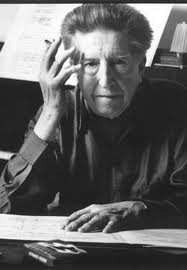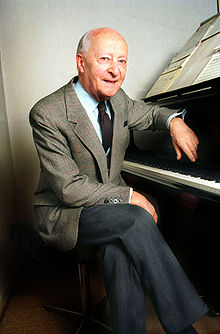January 21, 2013.Approaching Mozart’s birthday.The genius of Mozart, whose birthday we’ll celebrate on the 27th, overshadows all other composers born this week, but their contributions are substantial and worth mentioning.Henri Dutilleuxwill celebrate his 96th birthday tomorrow: he was born on January 22, 1916 in the historic town of Angers on the Loire River.Like so many other French composers, he studied at the Paris conservatory; he won the Grand Prix de Rome in 1938.Even though he started writing music early, Dutilleux wouldn’t number his compositions till the age of 30, as he considered his earlier pieces, including the Prize-winning cantata L'Anneau du Roi, not worth mentioning.Besides composing, he taught at the Ecole Normale de Musique and the Paris Conservatory.While influenced by Debussy and Ravel, Dutilleux’s music is highly original and contemporary.Here’s his String Quartet Ainsi la nuit (So, the night), from 1976.It’s performed by Wonhyee Bae and Tessa Lark, violins, Vicki Powell, viola, and Paul Dwyer, cello.
These days, Muzio Clementi, born January 24, 1752 and famous in his day, is mostly remembered as the composer of sonatas popular with music teachers, and also for his musical contest with Mozart in Vienna in 1781.Clementi and Mozart were to improvise on the themes suggested by the Emperor Joseph II, and play selections from their own compositions.The Emperor, for whose entertainment the contest was organized, diplomatically declared it a tie.But, though forgotten, Clementi did write some lovely music.Here’s his Sonata in B-flat Major, Op.24 No.2, played by the Korean-American pianist Young-Ah Tak.Note the opening bars of the sonata: they were later used by Mozart in his overture to the Magic Flute!
Also, Witold Lutoslawski, one of the greatest Polish (and European) composers of the 20th century, was born this week, on January 25, 1913.He stared studying violin, but later switched to piano and composition at the Warsaw conservatory.For a while he was also taking classes in mathematics at the University of Warsaw.Lutosławski was in the military when the Germans attacked Poland in September of 1939.He was captured but managed to escape.He made it to Warsaw and earned money by playing piano duets with his friend, the composer Andrzej Panufnik.After the Soviets liberated Poland and then installed a communist regime, life became increasingly difficult for Lutosławski.He was accused of “formalism” and his compositions were censored.These problems continued even after Stalin’s death, but eased somewhat after Lutosławski achieved international fame (Pierre Boulez premiered his Second symphony in 1966).Lutosławski, who always opposedcommunist rule, was a big supporter of the Solidarity movement in the early ‘80s.He was very prolific till the very end of his life.Lutosławski wrote four symphonies and a number of other symphonic compositions - concertos for piano, violin, cello (written and premiered by Mstislav Rostropovich) and many chamber and vocal pieces.Here’s Capriccio notturno ed Arioso from his Concerto for Orchestra (1950-1954).It’s performed by The Texas Festival Orchestra, Edwin Outwater conductor.The piece is written in Lutosławski’s earlier, “folkloristic” style, far removed from the atonal and even aleatoric music of his later compositions.
Approaching Mozart’s birthday - 2013
January 21, 2013. Approaching Mozart’s birthday. The genius of Mozart, whose birthday we’ll celebrate on the 27th, overshadows all other composers born this week, but their contributions are substantial and worth mentioning. Henri Dutilleux will celebrate his 96th birthday tomorrow: he was born on January 22, 1916 in the historic town of Angers on the Loire River. Like so many other French composers, he studied at the Paris conservatory; he won the Grand Prix de Rome in 1938. Even though he started writing music early, Dutilleux wouldn’t number his compositions till the age of 30, as he considered his earlier pieces, including the Prize-winning cantata L'Anneau du Roi, not worth mentioning. Besides composing, he taught at the Ecole Normale de Musique and the Paris Conservatory. While influenced by Debussy and Ravel, Dutilleux’s music is highly original and contemporary. Here’s his String Quartet Ainsi la nuit (So, the night), from 1976. It’s performed by Wonhyee Bae and Tessa Lark, violins, Vicki Powell, viola, and Paul Dwyer, cello.
27th, overshadows all other composers born this week, but their contributions are substantial and worth mentioning. Henri Dutilleux will celebrate his 96th birthday tomorrow: he was born on January 22, 1916 in the historic town of Angers on the Loire River. Like so many other French composers, he studied at the Paris conservatory; he won the Grand Prix de Rome in 1938. Even though he started writing music early, Dutilleux wouldn’t number his compositions till the age of 30, as he considered his earlier pieces, including the Prize-winning cantata L'Anneau du Roi, not worth mentioning. Besides composing, he taught at the Ecole Normale de Musique and the Paris Conservatory. While influenced by Debussy and Ravel, Dutilleux’s music is highly original and contemporary. Here’s his String Quartet Ainsi la nuit (So, the night), from 1976. It’s performed by Wonhyee Bae and Tessa Lark, violins, Vicki Powell, viola, and Paul Dwyer, cello.
These days, Muzio Clementi, born January 24, 1752 and famous in his day, is mostly remembered as the composer of sonatas popular with music teachers, and also for his musical contest with Mozart in Vienna in 1781. Clementi and Mozart were to improvise on the themes suggested by the Emperor Joseph II, and play selections from their own compositions. The Emperor, for whose entertainment the contest was organized, diplomatically declared it a tie. But, though forgotten, Clementi did write some lovely music. Here’s his Sonata in B-flat Major, Op.24 No.2, played by the Korean-American pianist Young-Ah Tak. Note the opening bars of the sonata: they were later used by Mozart in his overture to the Magic Flute!
Also, Witold Lutoslawski, one of the greatest Polish (and European) composers of the 20th century, was born this week, on January 25, 1913. He stared studying violin, but later switched to piano and composition at the Warsaw conservatory. For a while he was also taking classes in mathematics at the University of Warsaw. Lutosławski was in the military when the Germans attacked Poland in September of 1939. He was captured but managed to escape. He made it to Warsaw and earned money by playing piano duets with his friend, the composer Andrzej Panufnik. After the Soviets liberated Poland and then installed a communist regime, life became increasingly difficult for Lutosławski. He was accused of “formalism” and his compositions were censored. These problems continued even after Stalin’s death, but eased somewhat after Lutosławski achieved international fame (Pierre Boulez premiered his Second symphony in 1966). Lutosławski, who always opposed communist rule, was a big supporter of the Solidarity movement in the early ‘80s. He was very prolific till the very end of his life. Lutosławski wrote four symphonies and a number of other symphonic compositions - concertos for piano, violin, cello (written and premiered by Mstislav Rostropovich) and many chamber and vocal pieces. Here’s Capriccio notturno ed Arioso from his Concerto for Orchestra (1950-1954). It’s performed by The Texas Festival Orchestra, Edwin Outwater conductor. The piece is written in Lutosławski’s earlier, “folkloristic” style, far removed from the atonal and even aleatoric music of his later compositions.
He was accused of “formalism” and his compositions were censored. These problems continued even after Stalin’s death, but eased somewhat after Lutosławski achieved international fame (Pierre Boulez premiered his Second symphony in 1966). Lutosławski, who always opposed communist rule, was a big supporter of the Solidarity movement in the early ‘80s. He was very prolific till the very end of his life. Lutosławski wrote four symphonies and a number of other symphonic compositions - concertos for piano, violin, cello (written and premiered by Mstislav Rostropovich) and many chamber and vocal pieces. Here’s Capriccio notturno ed Arioso from his Concerto for Orchestra (1950-1954). It’s performed by The Texas Festival Orchestra, Edwin Outwater conductor. The piece is written in Lutosławski’s earlier, “folkloristic” style, far removed from the atonal and even aleatoric music of his later compositions.